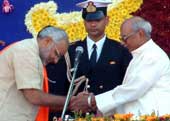|
|
| Back to basics |
After independence, India launched a socialist model of industrial development. On the one hand, mammoth state-run organizations like SAIL and Heavy Engineering Corporation were set up to become monopolies. Curiously, by a strange twist of logic, foundations were laid at the same time for science and technology by creating elite research and development laboratories and research centres divorced from the universities as well as from the monopolistic industries which had hardly any need for R&D. Farsighted leaders like Meghnad Saha protested against this in parliament. The argument was simple and obvious — cutting-edge research can only be sustained in universities, the cradle of young creative minds. This is the case in every advanced country. But to no avail. Huge resources that could have been poured into the universities, were diverted to these ivory tower national laboratories without a visible national mission.
Consequently, there was a major exodus of talented scientists from the universities to the national labs and research centres. They wallowed in their elitism to follow Western trends in pure science research or undertake R&D work of little interest to the local industry, leaving the universities to wither away. No wonder, hardly any significant discovery came from these labs and research institutes, and the universities were pushed to producing unemployable degree-holders.
Since globalization and liberalization, enormous opportunities have opened up in India for lucrative jobs in the industry, particularly in the services and IT sectors, which are employing the best brains in the country merely as coolies. Today’s mantras are management and IT. The salary differentials in the industry and academia are so enormous that even the best talents have too much temptation to overcome. The matter is further complicated by the fact that burdened by heavy and stereotyped syllabi and unhealthy competition for scoring marks, there is neither any scope in the school curricula nor any desire on the part of either the guardians or ill-trained school teachers to inculcate in children any sense of wonder and curiosity about the real world we live in. The basic conditions necessary for the flowering of the mind — leisure to think and the freedom to do what one enjoys doing — are sadly missing from an Indian child’s life today.
In my opinion, there is now a great opportunity in India to exploit a fundamental difference of outlook between the West and India, and to strike out a new path which will be pioneering. Under the impact of the scientific and industrial revolutions, exploitation of nature and subjugation of other cultures for profit became the hallmark of the West’s political and industrial culture. The result was disastrous — entire indigenous populations disappeared, forests disappeared, air, water and land became polluted, non-renewable natural energy resources like coal and oil were depleted to an alarming extent, and life itself is now threatened by global warming produced by an insatiable demand for more and more consumption for profit.
On the other hand, Indian cosmology and evolutionary theory have seen man in a totally different light — as a product of nature whose well-being depends critically on man’s harmony with nature. Ayurveda, India’s ancient medical system, is based on this harmony. Even when India was a rich and powerful country and its culture spread far and wide to China, Japan, south-east and south-west Asia, there was hardly any evidence of exploitative colonization in the European mode.
Can a new scientific culture that avoids these disasters be built? Yes, I believe so. We must expose our children to nature as much as possible. Nature is a great teacher. It does not stand in front of the desk and teach. No human being can ever match the 24x7 stimulus that nature sends to our senses and mind. Second, we must allow children time to think and enjoy. An unhappy and unwilling mind cannot learn anything. Third, we must cultivate in children a sense of aesthetics without which they will fail to recognize truth of any kind.
The final criterion of truth is anandam, the ineffable feeling of pure joy in discovery. Once one feels this anandam, ‘that’s it’, no further questions arise in the mind. Very few people realize that aesthetics has been a great motivation in science. (See, for example, Truth and Beauty: Aesthetics and Motivations in Science by S. Chandrasekhar Chicago, 1990). We must let children get familiar with the creative works of painters, sculptors, musicians, dancers, poets and novelists. Creativity in all these fields is very akin to creativity in science. Cross-fertilization of ideas is the key to creativity in any field.
Fourth, we must insist that they learn language and literature well. Without that, they will remain insensitive, incapable of understanding other people and other cultures, and nothing creative will ever emerge from them. Language creates the world we live in. The more sophisticated the language we use, the greater the freedom and power of our thoughts and the better the grasp of reality around us. This is why science had to invent the formal and abstract language of mathematics. Also, without the ability to read, hear, analyse and understand the constant bombardment of our ears and eyes by the media and politicians, and without the ability for clear and logical understanding and self-expression, there is no hope of any freedom of thought or democracy. Without these fundamental condi- tions there cannot be any scientific development.
The prime minister has set up a national knowledge commission to transform India into a knowledge-based society. Let us hope its recommendations will include courageous and far-reaching reforms. For merely tampering with the present system here and there will not help. Let us also hope that the government will have the courage, will and resources to implement them.
Meanwhile, each one of us must do whatever we can. It is heartening to learn that the Jagadish Bose National Talent Search, which has spotted, nurtured and motivated science talents for four decades in India, has recently decided to launch a state-of-the-art Science Camp movement in the country to expose thousands of school children to nature and the thrills of scientific discovery through hands-on experiments and self-learning. This should be a good beginning at the right level, for once children leave school, it is too late to change them.












